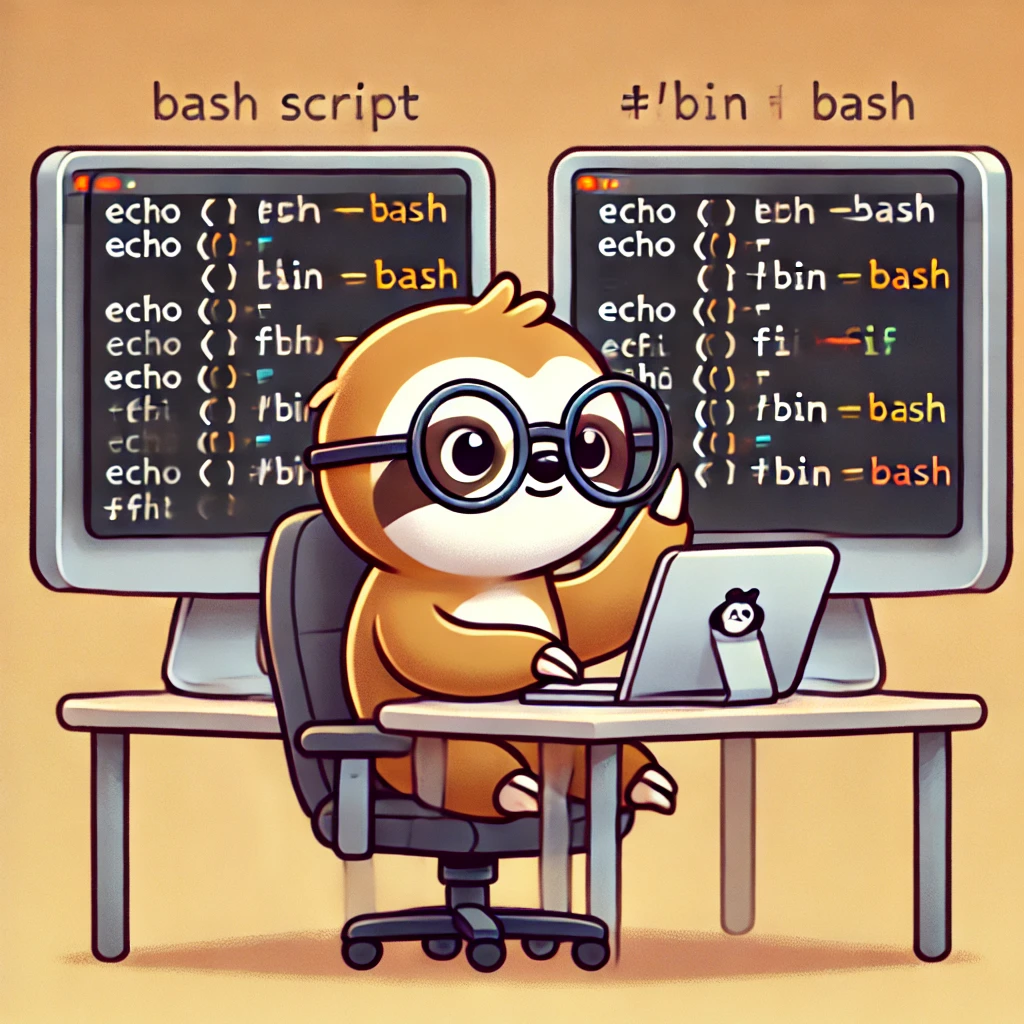
Once upon a time in a bustling tech company, there lived a clever, albeit slightly lazy, developer named Slothi.
Known for his knack for finding shortcuts, Slothi was assigned the task of creating a standardized bash script
structure for the organization.
With a deep sigh and a sip of their fifth coffee of the day, Slothi set out on his scripting quest.
The Journey
Slothi’s assignment was to create a bash script structure that would be versatile, easy to use, and could become a template for all future scripts in the company.
The script needed to handle arguments, provide help and usage information, and include robust error handling.
It sounded daunting, but Slothi knew just how to approach it.
As Slothi delved into the task, he realized the complexity of creating a script that could be both flexible and user-friendly.
“Why do all great adventures come with equally great challenges?” he mused. But with determination, Slothi began drafting his plan.
Slothi’s needed his template to cover a few areas:
- Handling variables, constants and setting up default values and placeholders.
- Handling different arguments and providing helpful messages.
- Making sure anyone using the script could easily understand how to do so.
- Incorporating clear error messages, logging and debug mode to troubleshoot issues.
- Handling the main script logic.
Variables and Constants
DEFAULT_VALUE="some value"Argument Parsing
while (($#)); do
case "$1" in
--required-param ) required_param=${2}; shift 2;;
--optional_param ) optional_param=${2}; shift 2;;
--debug ) debug=1; shift 1;;
--help ) help; exit 0;;
--usage ) usage; exit 0;;
* ) usage; error "unknown argument"; exit 1;;
esac
doneHelp and Usage Functions
function help {
echo "
NAME
$0 - short explanation what the script does
SYNOPSIS
$0 [--required-param <value>] [--optional_param <value>]
[--debug] [--help] [--usage]
$(arguments)
"
}
function usage {
echo " $(help)
DESCRIPTION
Sample script that shows template to be used for bashing.
In this section we should explain what the script does.
DEBUG
A debug flag has been provided to enable script execution in debug mode. This is done
to allow troubleshooting in case of issues with the script.
EXIT STATUS CODES:
Exit code 0 Success.
Exit code 1 General errors, Miscellaneous errors, such as 'divide by zero'
and other impermissible operations.
Exit code 2 Misuse of script operations. Missing keyword, argument, or permission problem.
Exit code 3 General issues. Missing artifacts, files, project, or failure to retrieve a project.
Exit code ? Non-zero exit status returned. Command failed to execute.
"
}Error Handling Debugging and Logging
attention() {
echo -e "\e[31m$(date "+%Y-%m-%d %H:%M:%S") - ATTENTION: ${1}\e[0m"
}
note() {
echo -e "\e[33m$(date "+%Y-%m-%d %H:%M:%S") - NOTE: ${1}\e[0m"
}
info() {
echo -e "\e[32m$(date "+%Y-%m-%d %H:%M:%S") - INFO: ${1}\e[0m"
}
error() {
echo -e "\e[31m$(date "+%Y-%m-%d %H:%M:%S") - ERROR: ${1}\e[0m"
}
if [[ ${debug} ]] ; then
echo "debug mode activated"
set -x
fiThe Template
#!/usr/bin/env bash
# ----- Variables -----
DEFAULT_VALUE="some value"
# ----- Functions -----
function arguments {
echo "
ARGUMENTS:
--required-param Required
Show case for a required parameter. Here we should explain the usage of the parameter
--optional_param Optional, Default: $DEFAULT_VALUE
Show case for a optional parameter. Here we should explain the usage of the parameter
--debug Optional.
Enables debug mode.
--help Prints out help.
--usage Prints out help.
"
}
function help {
echo "
NAME
$0 - short explanation what the script does
SYNOPSIS
$0 [--required-param <value>] [--optional_param <value>]
[--debug] [--help] [--usage]
$(arguments)
"
}
function usage {
echo " $(help)
DESCRIPTION
Sample script that shows template to be used for bashing.
In this section we should explain what the script does.
DEBUG
A debug flag has been provided to enable script execution in debug mode. This is done
to allow troubleshooting in case of issues with the script.
EXIT STATUS CODES:
Exit code 0 Success.
Exit code 1 General errors, Miscellaneous errors, such as 'divide by zero'
and other impermissible operations.
Exit code 2 Misuse of script operations. Missing keyword, argument, or permission problem.
Exit code 3 General issues. Missing artifacts, files, project, or failure to retrieve a project.
Exit code ? Non-zero exit status returned. Command failed to execute.
"
}
# https://misc.flogisoft.com/bash/tip_colors_and_formatting
error() {
echo -e "\e[31m$(date "+%Y-%m-%d %H:%M:%S") - ERROR: ${1}\e[0m"
}
attention() {
echo -e "\e[31m$(date "+%Y-%m-%d %H:%M:%S") - ATTENTION: ${1}\e[0m"
}
note() {
echo -e "\e[33m$(date "+%Y-%m-%d %H:%M:%S") - NOTE: ${1}\e[0m"
}
info() {
echo -e "\e[32m$(date "+%Y-%m-%d %H:%M:%S") - INFO: ${1}\e[0m"
}
some_function() {
local _param=$1
info "beginning execution of function with ${_param}"
# TODO: Add logic here
info "completed execution of function with ${_param}"
}
# ----- Main -----
if [[ $# -eq 0 ]]; then
usage; error "expects arguments"; exit 1;
fi
# argument parsing
while (($#)); do
case "$1" in
--required-param ) required_param=${2}; shift 2;;
--optional_param ) optional_param=${2}; shift 2;;
--debug ) debug=1; shift 1;;
--help ) help; exit 0;;
--usage ) usage; exit 0;;
* ) usage; error "unknown argument"; exit 1;;
esac
done
if [[ ${debug} ]] ; then
echo "debug mode activated"
set -x
fi
if [[ -z ${required_param} ]]; then
error "argument --required-param is required";
exit 2;
fi
if [[ -z ${optional_param} ]]; then
warn "argument --optional-param not provided. default: '${DEFAULT_VALUE}'";
optional_param=${DEFAULT_VALUE}
fi
# ----- Script logic ----
some_function "${required_param}"
exit 0
Bash Script Adventures Source Code
Slothi’s journey was one of creativity, problem-solving, and a bit of procrastination, but in the end, he succeeded.
The organization now had a standardized, user-friendly bash script template that could be used across various projects, making everyone’s lives a little easier.
And so, Slothi earned not only a well-deserved break but also the admiration of his peers. With a final sip of coffee,
Slothi leaned back and whispered, “Bash scripting, conquered.”